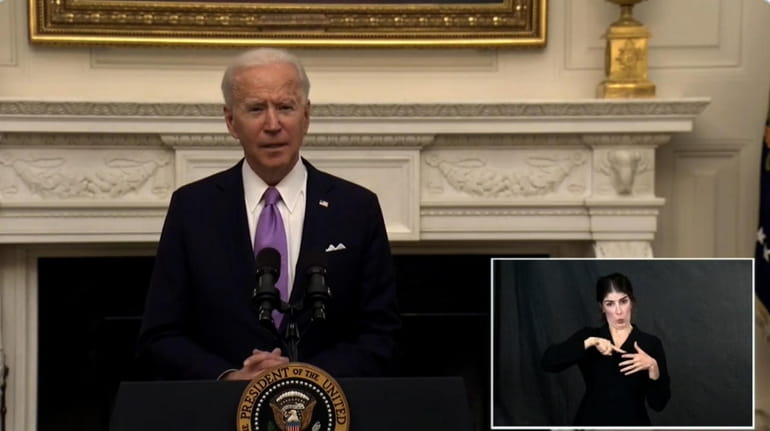Long Island Muslim leaders laud President Biden's travel ban reversal

Muslim leaders on Long Island hailed President Joe Biden’s decision to end a Trump administration travel ban from 13 nations, many with predominantly Muslim populations.
The ban, put in place shortly after President Donald Trump's inauguration in 2017, was called discriminatory and caused immeasurable pain to Muslims living and working in the United States, local advocates and Muslim officials said Thursday.
"It was very hurtful, very painful, for all of us," said Habeeb Ahmed, chairman of the Westbury Mosque, Islamic Center of Long Island. "The families could not get together. Somebody is sick. Somebody is getting married. … They could not because of the travel ban."
Biden issued an executive order reversing the ban from many Muslim-majority countries. Trump initially implemented it through his own executive order during the first days of his presidency. His first iteration of the order included bans on travelers from seven countries deemed security threats.
According to Biden’s executive order announced Wednesday during his first day in office, the "previous administration enacted a number of Executive Orders and Presidential Proclamations that prevented certain individuals from entering the United States — first from primarily Muslim countries, and later, from largely African countries. Those actions are a stain on our national conscience and inconsistent with our long history of welcoming people of all faiths and no faith at all." The order also said, "Make no mistake, where there are threats to our Nation, we will address them."
Trump’s order became a cornerstone of his immigration policy and was derided by critics as a "Muslim Ban." Its announcement prompted mass protests at airports throughout the country because people from the affected countries were detained and questioned for hours.
The order initially banned travel from Iraq, Syria, Iran, Libya, Somalia, Sudan and Yemen.
Facing legal challenges, the ban was amended multiple times. A third version, upheld by the U.S. Supreme Court, barred citizens from Iran, Libya, Somalia, Syria, Yemen, Venezuela and North Korea. Trump’s administration expanded it in February 2020 to also include Myanmar, Eritrea, Kyrgyzstan, Nigeria, Sudan and Tanzania.
Retired Seaford GOP House member Peter King maintained his support for the ban Thursday.
"It’s not a Muslim ban," he said. "These people are coming from countries that happen to be Muslim. The largest Muslim countries in the world aren’t even covered by it."
King stressed the issue was not about religion, but about security. "The Supreme Court upheld it. It was not aimed at Muslims. It was aimed at terrorists coming from countries that did not have proper vetting."
While Trump campaigned for the presidency in 2016, he called for a "total and complete shutdown of Muslims entering the United States."
Advocates viewed the ban as doing exactly that.
A statement Thursday from the Manhattan-based New York Immigration Coalition praised Biden’s move as critical.
Murad Awadeh, interim co-executive director of the organization, said in the statement: "Ending the Muslim Ban marks the beginning of erasing Trump’s heinous legacy on immigration," he said. "After four years of family separation and racial profiling, we are grateful to bring to a close an era marked by so much pain and senseless cruelty in our Muslim communities."
Critics said Trump’s ban not only separated families from certain targeted countries, but also halted legal immigration from those nations. It also caused drops in enrollments from students from the affected countries, detractors said.
Imran Rahman, president of the Islamic Association of Long Island, a mosque in Selden, said Thursday Biden’s order shifts toward a more inclusive approach.
"We welcome the executive order signed by President Biden to end this ban." "We look forward to good work from this administration to end the anti-immigrant approach to policy-making and make it more equitable for all different demographics."
Rahman added the ban certainly affected Muslims, and other groups on Long Island, because "we are all Americans."
He also said the Trump administration failed to identify threats to Americans by immigrants from the countries listed in the ban.
"It was not done justifiably to prevent a terrorist threat. If that is how it would have been done, everybody would understand it," Rahman said.
Ahmed, from the Westbury mosque, a lifelong Republican, said he never voted for Trump but did vote for Biden.
He said he’s optimistic of what a Biden administration can accomplish for all Americans.
"It’s refreshing to see that we are going back to our traditional ways in America … taking care of each other," Ahmed said.
Other executive orders:
- Halting construction on the Southern border wall by ending the national emergency declared by Trump to divert money for it.
- Preserving the Deferred Action for Childhood Arrivals program. Trump for years tried to end it. The program, known as DACA, protects from deportation some immigrants brought to the country as children, commonly called Dreamers.
- Revoking Trump’s plan excluding undocumented immigrants from the census count.
- Rescinding Trump’s executive order targeting aggressive efforts to find and deport immigrants who are in the country without proper authorization.
- Imposing a 100-day moratorium on most deportations beginning Friday. The moratorium is meant to review enforcement priorities
Source: Published reports.
